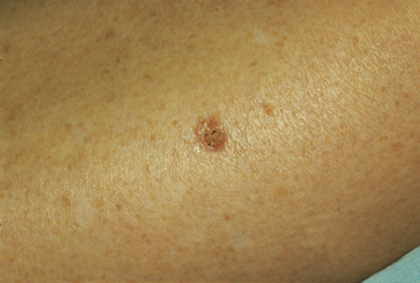MKSAP Quiz: Skin lesion that grows and bleeds
A 60-year-old man is evaluated for a skin lesion on his right wrist. He first noted the lesion several months ago, and it has grown and bled frequently over the past 6 weeks. The patient received a cadaveric renal transplant 3 years ago because of progressive chronic glomerulonephritis. He has maintained excellent allograft function on prednisone, cyclosporine, and mycophenolate mofetil.
Physical examination is unrevealing other than the skin lesion shown.

Which of the following is the most likely diagnosis?
A. Kaposi sarcoma
B. Melanoma
C. Psoriasis
D. Squamous cell carnicoma
Answer and critique
The correct answer is D) Squamous cell carcinoma. This question can be found in MKSAP 15 in the Dermatology section, item 5.
Long-term immunosuppression to prevent allograft rejection increases the risk of malignancy about 100 times that of the general population. The most common posttransplant cancers involve the skin, including the lips. Skin cancers in transplant recipients differ from those in the general population. Squamous cell carcinoma is more common than basal cell carcinoma in transplant recipients; transplant recipients develop lesions at an earlier age and at multiple sites; squamous cell carcinomas are usually associated with multiple warts and premalignant keratoses, such that their appearance may be misleading; and tumors in transplant recipients are more aggressive and are more likely to recur after resection. Superficial tumors can be managed with excision, and, in select instances, destructive methods including cryotherapy or electrodesiccation and curettage. Invasive cancers require excision with margin evaluation.
Kaposi sarcoma usually manifests as a purple nodule or plaque predominantly affecting the legs in persons of Mediterranean, Jewish, Arabic, Caribbean, or African descent, possibly related to the geographic distribution of human herpesvirus 8.
Melanoma may account for up to 6% of posttransplant skin cancers in adults, but the clinical features in this patient are not consistent with melanoma.
Psoriasis may occur in transplant recipients, but this patient's lesion is not typical of psoriasis, which typically presents as a thick, silvery scale on an erythematous plaque.
Key Point
- The most common cancers in transplant recipients involve the skin, particularly squamous cell carcinoma; these cancers are more aggressive than those in the general population.





